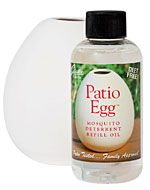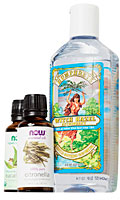sierraclub.org - sierra magazine - sept/oct 2012 - keeping bugs (and bears) at bay
Are natural insect repellents better than DEET? That depends on how risky the bite is.
By Michael Frank
Sometimes you have to risk one kind of danger to ward off another. When the threat is mosquitoes carrying malaria or West Nile virus, or black-legged ticks carrying Lyme disease, you might want to slather yourself with DEET (N,N-diethyl-meta-toluamide), the powerful insect repellent that has been saving lives worldwide for more than 50 years.
Relative to the dangers of malaria, those from DEET are considered as benign as a kitten—unless you are a kitten, or any other household pet, on whom DEET acts as a powerful neurotoxin, according to the Agency for Toxic Substances and Disease Registry. The Centers for Disease Control and Prevention advises against applying DEET on infants, or using it with sunscreen, because sunscreen has to be reapplied so frequently. And, as many grizzled hikers know, DEET can eat right through a tent. Do you really want to spray your face with a substance that can dissolve plastic?
If you must use a chemical product, know that the Food and Drug Administration recently approved topical-use permethrin and over-the-counter picaridin, both of which were already in widespread use in Europe and Asia. But the European Union lists permethrin as an endocrine disruptor, and it's been shown to cause tremors in dogs and cats, according to the National Pesticide Information Center. Of the two, picaridin is regarded as a healthier alternative.
The least toxic choice is to go natural. Tests show that ingredients like citronella, lemon eucalyptus, and geranium oils are less likely to cause side effects.
So, in the name of outdoor journalism (if not hard science), I braved a few bites to determine whether natural repellents actually work. My finding: Yes, some do, but only if they're applied frequently. Bug sprays work by blurring the "I am a tasty meal" scent that attracts insects.
But that deception is fleeting. In buggy areas, you may have to recoat up to once an hour to get the potion to work.
And remember: If you're in a place like Nigeria, where malaria kills more than 300,000 people a year, consider showering daily in DEET.

Active ingredient: Citronella oil
Independent research: The American Society of Pediatrics recommends citronella oil over higher doses of DEET for kids (but advises against it for babies younger than two months). A Korean Entomological Institute study found that citronella oil has "high repellent effectiveness" against mosquitoes.
Field test: Buzz Away worked well, but required reapplication as often as every 30 minutes.
Aroma: Pleasantly citrusy
$9 for 4 ounces, quantumhealth.com

Active ingredients: Soybean, citronella, and geranium oils (all organic), among others
Independent research: The New England Journal of Medicine says soybean oil may be an effective shield against mosquitoes, and a disease vector study concluded that geranium oil is stronger than citronella oil.
Field test: Lather up (really, use more than you think you should), then laugh at the mosquitoes.
Aroma: A little chemically and slightly sweet. But tolerable.
$12 for 4 ounces, badgerbalm.com

Active ingredients: Geraniol and lemongrass oil
Independent research: Because it uses 95 percent geraniol (the active component in geranium oil), this sucker packs a punch.
Field test: Park (or hang) this diffuser, or "egg," on the patio to keep pests away. But bite-prone folks may still need a secondary repellent. Also, you'll need to replenish the oil after it evaporates.
Aroma: Mildly soapy
$18 for the egg, including 4 ounces of oil, scentshop.com

Ingredients: Witch hazel, citronella oil, and eucalyptus oil. Pour 1.5 ounces of witch hazel into a 2-ounce pump-spray bottle. Add 10 drops of citronella oil and 10 drops of eucalyptus oil. Shake vigorously.
Field test: Not great. So I added 10 more drops of each, tested for efficacy, then added another 10, and kept testing until I got up to 40 drops of each. The result was an effective repellent that required less frequent application than Buzz Away or Badger.
Caution: Even natural ingredients can irritate or be poisonous, so err on the side of using too little.

The best anti-bear pepper spray is the largest canister you can find with the longest spray duration and distance. (Experts recommend sprays of at least six seconds that reach at least 25 feet.) Too many tales of bear-on-human attacks involve "trigger lock"—a panicked person holds the trigger until the can is drained, at which point the bear comes back. Counter Assault meets the size, length, and distance recommendations. Pricey, but cheaper than a ride in a medical chopper. $55 for 10.2 ounces, counterassault.com
This article has been corrected.
Lori Eanes (5)